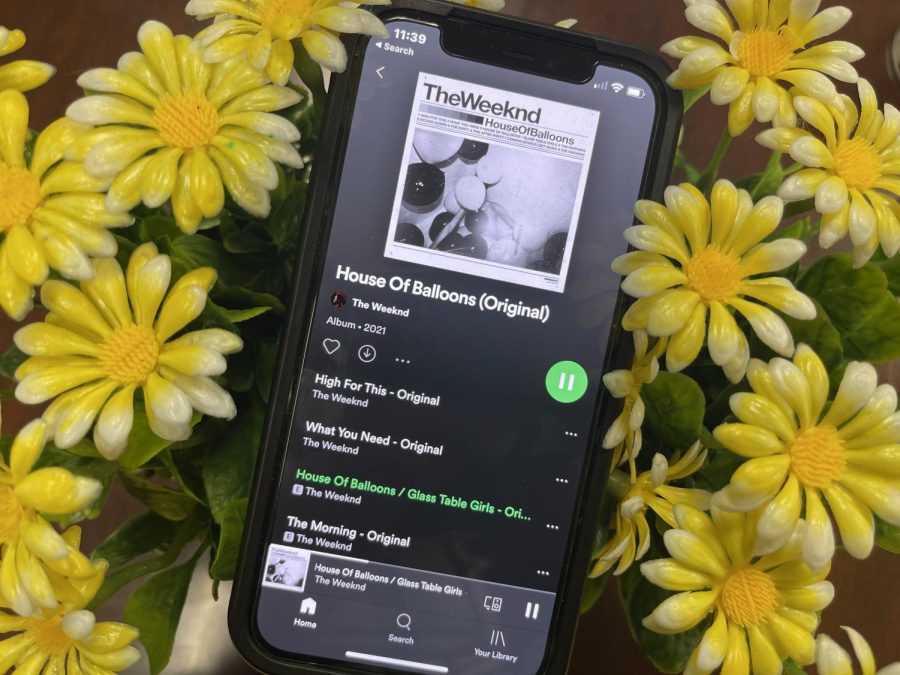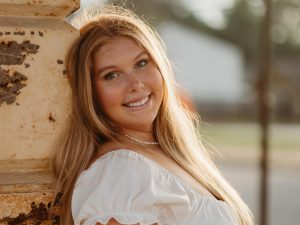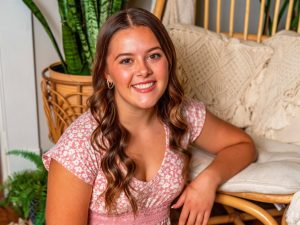The Weeknd’s Debut Album Ten Years Later
The Weeknd recently rereleased his debut album in honor of its tenth anniversary.
April 6, 2021
Six albums, one EP, a Super Bowl Halftime performance, and one of the greatest songs to grace the Billboard Charts in history – Abel Tesfaye, also known as The Weeknd, has already cemented himself in music history.
His illustrious career, highlighted by his alternative and progressive take on R&B music, has changed how audiences perceive music forever.
It all started with his first album and one of the best albums of the 2010s – House of Balloons.
The Weeknd just re-released his debut album in honor of its tenth anniversary, which has allowed his fans to look back at an incredible decade for Tesfaye and see how much he has grown as an artist and a person.
House of Balloons was released on March 21, 2011. This album is the first in his series of albums entitled Trilogy. During this 49-minute and 34-second experience, listeners take a deep dive into The Weeknd’s rambunctious and rowdy lifestyle.
The LP kicks off with “High For This,” which describes a new relationship that isn’t good for either party involved and the rollercoaster of emotions that comes with such an unhealthy, superficial relationship.
In “What You Need,” the second song on the album, Abel embraces his fast-paced, toxic lifestyle that he has noticed himself falling into lately. He expresses feeling numb and unable to care about anyone that leaves him. He also conveys sentiments of superiority throughout the song, especially in regards to his relationships. Those relationships provide him company, which allows him to avoid his loneliness.
In the best track of the album, “House of Balloons/Glass Table Girls,” The Weeknd introduces his signature two-part song. The first part of this song has an upbeat flow that strongly contrasts with its dark and morbid lyrics. Abel expresses the need to find an escape from his lifestyle, but he feels as if there is no way out. He is adamant about convincing himself that he is happy in the house he lives in.
In the second half of this two-part track, “Glass Table Girls,” the bass gets heavier, and the flow accelerates. It’s a look into how toxic his lifestyle truly is and how unhealthy it is for someone to live like that. Despite the darker vibe of this song, it’s incredible. The Weeknd’s performance of this song at the Super Bowl was breathtaking.
“The Morning” is one of the most remembered songs from the LP. This track provides a true R&B feel that a lot of listeners were looking for throughout the album. It is a true reminder that he was only 21 years old at the time of the release of this album, and what he prioritized as a young adult isn’t actually all that important. This song is one of the first songs in which The Weeknd is giving some true reflection on his life, expressing that money and fame can easily distract him from his real life.
The entire vibe of the album switches when it arrives at “Wicked Games.” He opens the song with the line: “I left my girl back home, I don’t love her no more.” He discusses that he has worn his heart on his sleeve his whole life, and it has triggered the scars that he wears on his body. He only wants the love and affection that he never really received as a child. Even though he knows the girls he’s with won’t completely fill that void, he still achingly wants to hear those three magic words.
The sixth song of the album, “The Party & The After Party,” is another two-part song. In this track, Abel is trying to assure the people closest to him that he is there for them. He also reminds them that he needs them just as badly as they need him. However, The Weeknd also knows that he will eventually abandon them like he always does. He knows that he will continue running and looking for that adventure and adrenaline rush with new, different people.
In the second half of this two-part track, The Weeknd does just that. He realizes that these fake, fragile relationships are not what he’s truly searching for in his life. Abel is dancing around the fact that these girls are in the same broken place as he is, and they have no love to give him to fill that void.
“Coming Down” kicks off the final third of the LP, and it’s the first time Abel expresses remorse. He discusses how he is genuinely trying to be a better person, one who can be a reliable partner in a solid relationship. Still, he sometimes loses himself while under the influence. He knows that he can become a better man. But deep down, he knows that the relapses that follow his failed attempts at bettering himself will hurt far worse. This honest perspective on how addiction can affect a person’s life is groundbreaking.
The Weeknd highlights one of those relapses in the eighth song on the album, “Loft Music.” In this track, The Weekend is back to his old ways. He gets caught back up in the city life, that young and wild 21-year-old life he doesn’t want but craves. He needs numerous superficial relationships to make him feel loved and to continue running his adrenaline through the roof in an attempt to fill every void he feels.
Closing out the original album is “The Knowing,” which has many possible interpretations. One possible explanation is that this song details Abel finding out about his significant other cheating on him, which would start a snowball effect for the rest of the tracks throughout Trilogy.
In the Trilogy series, The Weeknd added one song to each album after its original release. For the House of Balloons album, he added the song “Twenty Eight,” which should have made the initial release. It is possible that this track did not make the original cut because it did not fit Abel’s persona at the time. He does have a few moments in “Coming Down” that show the weaknesses he tries to hide. However, “Twenty Eight” exposes these weaknesses even further, offering a more vulnerable side of him. This song is an excellent close to the LP because it carries straight into Trilogy’s second album – Thursday.
Looking back on the album, it was an amazing start to an illustrious career for Abel Tesfaye, highlighted by his recent success with the Super Bowl Halftime Show. Re-releasing this album on its tenth anniversary displays the growth and progress that Abel has experienced and allows him to reflect on the person he has become in the last decade, not only as an artist but also as a person.
It is clear to see his struggles with addiction throughout Trilogy (2012), Kiss Land (2013), and even in the lighter parts of Beauty Behind the Madness (2015). It isn’t until his Starboy (2016) album that you see The Weeknd become a different person. With his release of My Dear Melancholy (2018), Abel switches it up and releases an EP that is strictly ballads, further demonstrating the growth in his personal life and career.
Finally, into his most recent album, After Hours (2020), The Weeknd has experienced a lot of genuine, authentic growth. This growth may be partially due to his success and the privilege of performing at the Halftime Show of the Super Bowl, along with nearly 30 million followers on Instagram.
Recently, The Weeknd boasted outstanding numbers on one of his latest singles, “Blinding Lights,” which is still sitting in the top 10 on the Billboard Top 100 Charts a year and a half after its release.
The Weeknd is a true symbolic figure of growth and progression and will only get better as time goes on.









